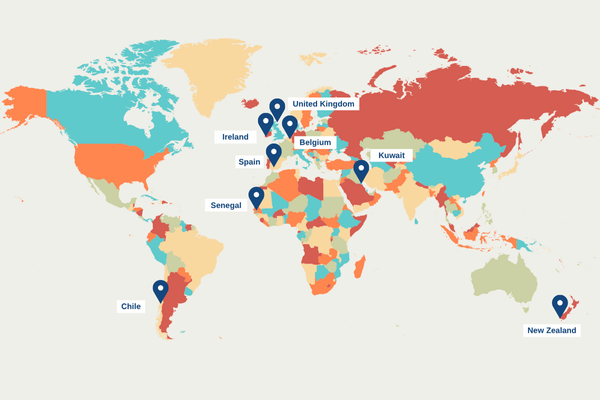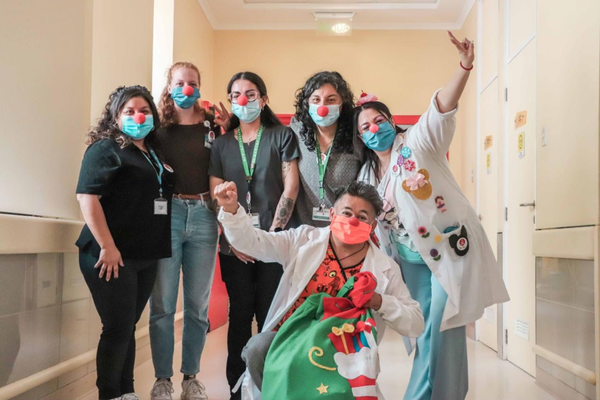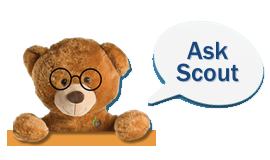.png?sfvrsn=7017f4c_1)
Molly Gleydura, BA, CCLS
Molly Gleydura, BA, CCLS is a child life specialist at Cleveland Clinic in Cleveland, Ohio. Molly has found joy in supporting all children and families who visit the hospital in her role as a float specialist, working with inpatient, outpatient, and children of adult patient populations.

March 2022: I am several weeks into my much-anticipated child life practicum, when I receive an email telling me that I have just been awarded a Watson Fellowship to complete a year-long self-directed project abroad. That time was marked by intense excitement, but also shadows of worry about how my journey to becoming a child life specialist might be affected.
Flash forward to today: Having just completed my first year as a Certified Child Life Specialist, I can proudly say that I would not be the specialist that I am had I not taken this unconventional path.
Let me bring you up to speed. Upon completing my child life coursework on death and dying, I created a 70-page guide on how to work with children and families facing the end of life and following a death. Even after completing a semester of research on the topic, though, I felt that I had much more to learn and needed new perspectives to broaden my understanding of how to provide this type of support.
That’s where my Watson Fellowship fits in.
The program allows recent college graduates to pursue a project of interest outside of the United States for one full year. From August 2022 to August 2023, I traveled to eight different countries to explore how best to support children and families before, during, and after the death of a child. Over the course of that year, I lived in New Zealand, Chile, Spain, Senegal, Kuwait, Belgium, Ireland, and the UK. I worked and connected with rural and national hospital systems, hospital- and community-based psychosocial support organizations, pediatric hospices, funeral homes, researchers, professors, patients, and families.
My year of seeking out new perspectives, challenging my understanding, questioning my assumptions, and—most importantly, listening intently—has shaped my first year as a CCLS in unimaginable ways. Three important lessons that I learned while abroad now serve as daily personal mantras, guiding my practice as a CCLS. Every day, I think about the importance of reducing stress and confusion for patients and families within the hospital system; the value of approaching others with empathy and assuming best intentions; and the critical role of community as a source of support and self-care.
.png?sfvrsn=9d017f4c_1)
Navigating the Healthcare System is a Major Stressor
I knew this in theory, but it didn’t hit me until I arrived to work in New Zealand, just five days after leaving the U.S. I realized it even before stepping inside the hospital, frantically texting the pediatric palliative care physician I was shadowing at Starship Hospital for over ten minutes, trying to find the right entrance. Despite my confidence in medical terminology and hospital routines, I felt confused, overwhelmed, and lost.
The hospital environment is often one that heightens stress, challenges coping skills, and emphasizes a loss of control for those navigating it. This is especially evident when patients and families face complex illnesses, require invasive or substantial care, have low medical literacy, or face language or cultural barriers. Although I wasn’t a patient there, I found it hard to keep track of details, remember the questions that I wanted to ask, and understand what I was being told.
It is important to note that as a Type 1 Diabetic myself, I am no stranger to navigating healthcare systems as a patient. In fact, prior to my year abroad, I spent five months visiting doctors’ offices and close to 100 hours on the phone with my insurance company preparing to navigate my chronic illness while away from my support system. My endocrinologist at home advised that I see endocrinologists abroad four times throughout the year. I was unable to visit a single endocrinologist that year, because I hit roadblock after roadblock trying to figure out how to get an appointment, meet with a specialist, or have routine testing done. When I finally met with a doctor in Chile I managed to check in at the wrong desk, sit in the wrong waiting room and realized , too late, that I had made an appointment with the wrong provider. Each mistake I made heightened my feelings of overwhelm and lessened my ability to retain the information provided to me. Once the visit was completed and I walked out of the room with a handwritten prescription to be filled, I had to Google the medication to recall what the doctor had told me about it. As I nervously approached the pharmacy, a technician noticed my obvious distress and walked me through everything I needed to know and do. I felt my heart rate settle as she took the time to offer compassion and support, recognizing the anxiety evoked by the situation and setting
When I began working as a child life specialist, meeting patients and families, I was reminded of my own feelings of stress and confusion. In my first year on the job, I have taken every opportunity I could to add moments of calm and clarity into the hospital environment. It was in the moments when those with whom I worked noticed my confusion, helped me take a breath, and ensured my understanding that I was able to really be present during my time abroad. So now it is my goal to provide those kinds of moments to the patients and families I see every day.
Always Assume the Best Intentions
I hate to admit how much my time abroad opened my eyes to the biases, assumptions, and subjective ideas taken as objective facts that I and many others unconsciously operate on daily. Based on what I learned in my coursework and student experiences, I was adamant, to the point of self-righteousness, that the best and only just practice is to fully inform children about all aspects of their medical experience.
f4f8122d-6fbe-49c5-bd10-1396ed05f676.png?sfvrsn=68007f4c_1)
When I began working as a child life specialist, meeting patients and families, I was reminded of my own feelings of stress and confusion. In my first year on the job, I have taken every opportunity I could to add moments of calm and clarity into the hospital environment. It was in the moments when those with whom I worked noticed my confusion, helped me take a breath, and ensured my understanding that I was able to really be present during my time abroad. So now it is my goal to provide those kinds of moments to the patients and families I see every day.
That was until I heard the perspective of a family in Senegal that was planning to do the exact opposite.
While working with the psycho-oncology team in the only pediatric oncology center in the entire country, I met a family of a teenager who traveled many miles to reach the clinic and finally figure out what was causing their child’s symptoms. After a couple of days and several tests, it was determined that the teenager had acute myeloid leukemia—a fatal diagnosis in Senegal, as there are no curative treatment options available in the country. Every child in Senegal who receives this diagnosis is immediately placed under the care of palliative services. When the father first shared his plan to not tell his child this news, I felt uneasy about the ethicality of the decision.
I brought these concerns to the psycho-oncology team that I worked with there, citing research and conversations around beneficence and veracity. Of course, the professionals with whom I was working also understood and valued these principles. What they knew, and I didn’t yet, was the stark difference in life expectancy for pediatric cancers in the U.S. compared to Senegal, despite the best efforts of well-trained doctors, nurses, and other team members. They explained that based on population statistics and childhood cancer rates, the team estimates that only about a quarter of patients with pediatric cancer in the country ever make it to their service. Of the children who are followed by the team, only about 50% survive their diagnosis, with several having no path to survival. For me, these facts are hard to accept, reconcile, and process. My suggestion to tell the teenager of the diagnosis would have met the principle of veracity, but in this case, it would not have been beneficent, as the father pointed out.
In our conversation, the father explained that several years ago, the teenager’s best friend received the same diagnosis. The friend, though, was able to travel to Europe to receive treatment and a bone marrow transplant, returning to Senegal in remission. Our patient’s family, though, could not afford any treatment at all—not in Senegal, let alone abroad. The father knew the outcome of this diagnosis and he knew that the ending would change by the teenager knowing the disease’s name.
What would be different was how that remaining time together would be spent. The father opted to not tell the teenager of the diagnosis to allow for the rest of their life together to be spent focusing on love, connection, and meaningful moments rather than resentment, isolation, and longing for a treatment that exists but is not available to them.
In challenging moments that I have encountered since, I aim to remind myself to operate with empathy and compassion, based on the belief that everyone acts from a place of good intentions.
In the U.S., I met the family of a child newly diagnosed with a brain tumor. The medical team urged immediate surgery and treatment, while the family asked to delay care in favor of prayer and religious practices. Tension rose as each side viewed the other as misguided or paternalistic. Neither could be certain that the other’s plan would succeed. Only when compassion replaced conflict did they reach a mutual course of action. Both were fighting for what they believed best for the child—they just initially disagreed on what that was.
There have been so many moments that I have encountered during my first year as a CCLS that have reminded me of these situations. When they occur, I encourage myself to always assume the best intentions from all involved. With this mindset, it is much easier to listen, understand, and support.
Community is a Powerful Source of Support and Self-Care

I have countless stories from my time abroad, where I both observed and experienced the power of community.
In Chile, I spoke with room attendants from the Ronald McDonald Family Rooms and House to hear their perspective on providing support to families experiencing medical challenges. During many of the conversations, room attendants would say something along the lines of "I'm not working as a doctor, psychologist, therapist, or social worker. ”The majority of the room assistants commented on their inability to solve the healthcare issues of the child or take away any depression a parent might be experiencing. Many said that they make a point not to say that things will be okay or to offer any advice in general. But, what they did was listen and showed they cared. The Ronald McDonald Family Rooms held a mixture of laughter, tears, frustration, and gratitude. Families told me that the hospitals felt very stressful and tense, but when they walked into the family rooms, they felt like they could finally take a breath. They knew that there were people there who were ready to listen as families told their stories, or to sit in silence when words were not enough.
In my work as a CCLS, it has been important to me to build a community that I can trust, rely upon, and confide in, both inside and outside of work. In fact, this has proven to be invaluable. My intentional building of a community has served as a unique form of support group for me, one that celebrates the wins, commiserates on the challenges, and troubleshoots solutions. Community provides emotional validation, stress reduction, a means to enhance coping skills, and a sense of belonging. Not only are these pillars of meaningful support, but they are also important tools for self-care that reduce burnout and compassion fatigue.
Feeling cared for helps you to have the capacity to care for others.
Takeaways
I am beyond grateful for the lessons that I learned from my Watson Fellowship and for the lessons that my colleagues, patients, and their families continue to teach me in my work as a CCLS.
For those who are able, I will always recommend working and spending time abroad with the goal of learning. For those who aren’t able, I encourage you to continue to challenge your biases and seek knowledge from diverse stories and perspectives. There are so many memoirs, articles, and personal accounts that have been produced by individuals around the world that have continued to shape and test my understanding of what care looks like. I know that these works have helped me to be an even better CCLS.
Through sharing the lessons that I have learned, I hope that you, too, can reflect on the values that ground your work. Spend those extra moments making the hospital environment feel less foreign, reframe interactions to see the good, and pour into your own community to find support.
Ultimately, I hope that this detailing of my point of view as one CCLS, will provide a small window of support for child life students. Please don’t be afraid to take a different path—you never know how those experiences may shape your practice and benefit the patients and families whose lives you have the great privilege of intersecting.
Print to PDF
